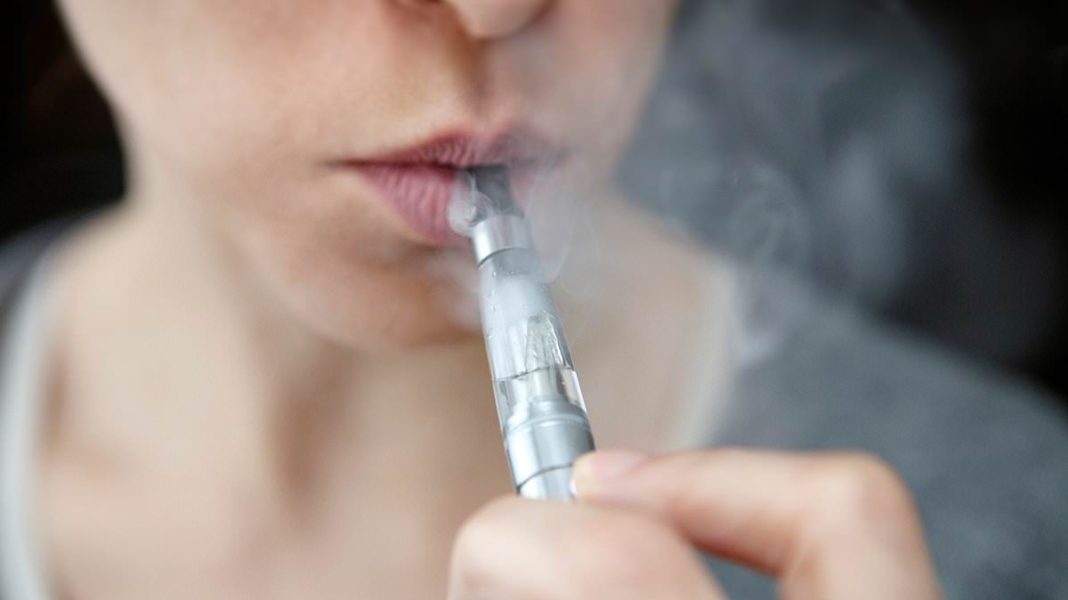At least five million people in Britain vape on a regular basis – and roughly one million of them have never been smokers.
E-cigarettes are more popular than ever before not just among tobacco users looking to quit but also non-smokers who want the buzz of a nicotine hit, without the deadly side-effects of toxins in cigarettes.
But worrying new evidence suggests that while e-cigarettes may be safer than tobacco, they are far from harmless.
Earlier this week, it was reported that a man from New Jersey in the US died from an aggressive lung cancer which doctors say may have been caused by vaping.
It’s the first time the gadgets have been directly linked with triggering lung cancer – something tobacco is notorious for.
The 51-year-old quit smoking in 2009 after a decade of tobacco use and took up vaping instead.
But in 2020, doctors found a tumour the size of a deck of cards in his left lung when he complained of shortness of breath, chest pain, unplanned weight loss and coughing up blood.
Writing in the American Journal of Case Reports, doctors said given his relatively young age at the time of diagnosis, the fact that he’d quit tobacco years earlier and his regular vaping habit, ‘the prolonged use of e-cigarettes’ could have been a trigger.
The devices can deliver harmful substances deep into the lungs, including formaldehyde, acetaldehyde and other volatile organic compounds known to cause cancer.
These can damage lung tissue and over time, this causes DNA mutations and inflammation which increase the risk of a tumour.
The man died after the tumour spread when he failed to respond to treatment
In May 2024, 17-year-old Kyla Blight, a student from Cumbria, who’d been vaping since she was 15, made headlines after being rushed to hospital with a collapsed lung linked to her 4,000 puffs a week on vapes (the equivalent to 400 cigarettes).
She needed five-and-a-half hours of surgery to remove part of her lung.
So what exactly are the risks from vaping and how does it harm the body’s major organs?
DNA DAMAGE TO THE LUNGS
The evidence on e-cigarette use and lung cancer is mounting. A research review, published in the journal Cancers in September 2023, concluded that vapes were ‘an area of significant concern’ when it came to the risk of developing the disease.
One possible culprit is glycerol in vapes, which is safe to consume in its normal state but, when heated in vapes, can form the carcinogenic chemical formaldehyde, which is then inhaled into the lungs.
Professor Kefah Mokbel, a consultant breast surgeon at the London Breast Institute, said vaping has also been linked to ‘various types of cancer, including head and neck cancers, lung cancer and breast cancer, as well as blood, prostate, and bladder cancers’.
He points to animal and laboratory studies on cells that suggest vaping may cause DNA damage, inflammation and other signs that can precede a tumour.
And although much of the evidence is based on animal studies, it’s still ‘robust’, he says.
And the American Cancer Society warns: ‘Makers of e-cigarettes often claim the ingredients are safe. But aerosols that these products produce can contain addictive nicotine, flavourings and other chemicals, some known to be toxic or to cause cancer.
‘The levels of these substances appear to be lower than in cigarettes, but the amounts of nicotine and other substances in these products can vary because they are not standardised.’
Vaping has also been linked to lipoid pneumonia, where the alveoli (tiny air sacs deep in the lungs) fill with dead white blood cells laden with fatty material, which in turn causes inflammation and infection in the airways.
This build-up of white blood cells is believed to be due to the glycerol, used in e-liquids to -create thicker vapour.
INCREASED HEART RATE
Once inhaled, the nicotine in e-liquid rapidly enters your bloodstream, causing the body to release adrenaline, which in turn raises your blood pressure, pulse and breathing rates.
‘Nicotine is a problem for people with heart disease,’ says Julie Ward, a senior cardiac nurse at the British Heart Foundation.
‘It raises the heart rate, contradicting the goal of most treatments. If you have heart disease and are using nicotine replacements, such as vapes, speak to your GP first.’
Chris Pepper, a consultant cardiologist at Leeds General Infirmary, says: ‘I always recommend that patients quit smoking and vaping for the sake of their heart health,’ adding that nicotine is associated with inflammation and damage to cells, known precursors to a raised risk of cardiovascular problems.
Research presented at the American Heart Association conference in October 2023 showed that e-cigarette users regularly exposed to nicotine consistently performed worse than non-vapers on treadmill tests – with effects similar to those from cigarettes.
LEAKY GUT
The gut wall prevents harmful microbes in the digestive tract migrating into the bloodstream.
However, a study in Science in 2021 found the chemicals in nicotine-free vape liquids could disrupt this protective barrier, leading to ‘leaky’ gut, which in turn can lead to chronic inflammation.
‘Such inflammation can contribute to a variety of diseases and conditions, including inflammatory bowel disease, dementia, certain cancers, atherosclerosis [hardening arteries], liver fibrosis [scarring], diabetes and arthritis,’ said Aditi Sharma, an immunologist at the University of California, San Francisco, who was involved in the research.
She said vaping causes inflammation that breaks up the natural formation of gut cells, causing a leaky gut, which allows easy passage of its constituents into the bloodstream.
‘Vaping triggers something like a more severe form of irritable bowel syndrome,’ she says.
BRAIN FOG AND POOR MEMORY
Our brains appear to be highly sensitive to the effects of e-cigarette chemicals.
Vaping is linked to mental ‘fog’, according to two studies by the University of Rochester in the US in 2020. These found that both adults and children who vape were more likely to report difficulties in concentrating and remembering or making decisions than their non-vaping peers.
But it’s not conclusive – researchers stressed it could just be that people who report mental fog are simply more likely to smoke or vape, possibly to self-medicate.
WEAKENED IMMUNE SYSTEM
Could vaping damage your immune system? Yes, according to a study last year in the Journal of Allergy and Clinical Immunology, which found inhaling e-cigarette vapour could damage neutrophils, one of the first immune cells to respond if bacteria or viruses enter the body.
The findings are important as previous research has shown that damage caused to neutrophils by cigarette smoking can lead to long-term lung damage.
Researchers at Birmingham University took blood samples from healthy donors who had never smoked or vaped. Their neutrophils were then exposed to 40 puffs of vape vapour (an amount previous studies have shown is a low daily exposure).
The neutrophils remained alive but became ‘stuck’, incapable of tackling threats to the body, such as E.coli bacteria – a common source of food poisoning.
Aaron Scott, an associate professor in respiratory science and lead author of the study, said: ‘We found that after short, low-level exposure to e-cigarette vapour, the cells remain alive but can no longer move as effectively and are unable to carry out their normal protective functions.
‘Interestingly, vapour from e-liquids which did not contain nicotine also had the same negative effects as vapour from e-liquids which did contain nicotine.’
BAD BREATH AND TOOTH LOSS
The nicotine in vapes can also stain your teeth and lead to bad breath, gum disease and receding gums, suggests Mervyn Druian, a dentist at the London Centre for Cosmetic Dentistry.
‘Nicotine causes vasoconstriction (narrowing) of blood vessels in the mouth and reduces oxygenated blood reaching the gums,’ he explains. ‘Over time, this can lead to tissue receding and tooth loss.’
And a recent review of studies published in the journal Medicina warned: ‘Vaping can introduce bacteria that contribute to the development of oral diseases in our body. In addition, there are studies that suggest that quitting vaping could be associated with an improvement in oral health.’
E-cigarette users can also experience similar pre-cancerous DNA changes in certain cheek cells as smokers do, according to a study led by University College London and the University of Innsbruck in Austria.
SAGGY SKIN
Smoking has been linked to wrinkles. While there is less data about vaping, the nicotine in vapes is the main concern, says Dr Justine Hextall, a consultant dermatologist in Arundel, West Sussex.
This is because it constricts blood vessels and reduces blood flow to the skin, so less oxygen and essential nutrients reach the cells. Nicotine also reduces collagen production, leading to decreased skin elasticity.
Some studies also suggest vaping can slow down the rate at which wounds heal in major operations such as knee replacement surgery and result in longer hospital stays, as it takes patients longer to recover.






